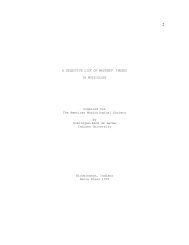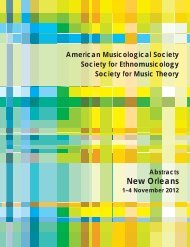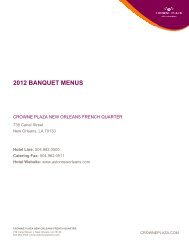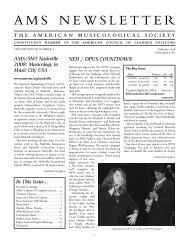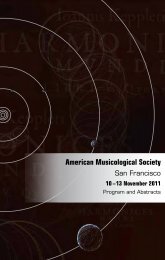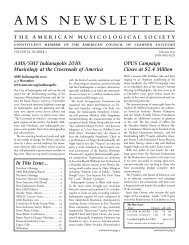AMS Philadelphia 2009 Abstracts - American Musicological Society
AMS Philadelphia 2009 Abstracts - American Musicological Society
AMS Philadelphia 2009 Abstracts - American Musicological Society
You also want an ePaper? Increase the reach of your titles
YUMPU automatically turns print PDFs into web optimized ePapers that Google loves.
122 saturday morning <strong>AMS</strong> <strong>Philadelphia</strong> <strong>2009</strong><br />
imitations of and suspensions against the melodies, generate textures and harmonies that<br />
sound less folksy than urbane, and somewhat archaic by late eighteenth-century standards.<br />
Haydn’s choice has provoked controversy. Scholars of Scottish music accuse him of distorting<br />
folk melodies with inappropriate ornamentation and classical harmony, while Haydn specialists<br />
praise his sympathy for the “spirit” of the tunes and their often “non-classical” structure.<br />
My paper argues that Haydn’s fidelity to his sources is less significant than the politically<br />
fraught tension his accompaniments express, a tension between national distinctiveness<br />
and imperial cosmopolitanism that characterizes many eighteenth-century representations<br />
of Scotland. As literary historians have emphasized, following the 1707 Act of Union with<br />
England Scottish intellectuals strove at once to preserve a sense of national identity and to<br />
capitalize on their newfound access to British imperial markets (Leith Davis, Steve Newman,<br />
Katie Trumpener). Matthew Gelbart and others have shown that song collections played an<br />
important role in this two-edged project, producing a heroic-pastoral image of Scotland that<br />
could be sold in England and beyond as well as at home. The mixed goals of the collections are<br />
evident in the song texts, which are rarely traditional lyrics but rather revisions or entirely new<br />
texts by Scottish poets including Robert Burns. They adjust Scots dialect and subject matter<br />
to suit contemporary, English-speaking tastes.<br />
Likewise in the music, many of the tunes set by Haydn had been altered or newly composed<br />
within the preceding few decades. His accompaniments in effect continue the process of reinvention,<br />
assimilating “folk” characteristics such as plagal cadences and “dual tonics” (e.g.,<br />
scale degrees 1 and 6 in major modes) into what is otherwise an unmistakable, if somewhat<br />
outdated style of “art music.” As his publishers undoubtedly hoped, the musical adaptation<br />
reinforces the artful rewriting of the song texts. Clothing the melodies in a sophisticated, historically<br />
resonant musical style remakes them into the kind of venerable high-art legacy the<br />
Scottish intelligentsia wanted to claim for the nation, especially after Samuel Johnson’s Journey<br />
to the Western isles of Scotland (1775) declared that Scotland had no culture worth preserving.<br />
At the same time, the international familiarity of Haydn’s textural and harmonic language deemphasizes<br />
the songs’ “Scottishness,” rendering them suitable for any salon or musical society<br />
that cultivated English-language keyboard song. In that sense the accompaniments stage the<br />
artistic and economic integration of Scottish culture into a broader, “British” identity.<br />
ORCHESTRAL REVOLUTIONS: HAYDN’S LEGACY<br />
AND THE HISTORY OF EFFECT<br />
Emily I. Dolan<br />
University of Pennsylvania<br />
At the beginning of the nineteenth century, Haydn was the most famous composer in<br />
Europe; he was praised in verse and awarded medals. By the end of the century, by contrast,<br />
he had transformed into an affable father figure, an innocuous musical prankster who was<br />
respected from a distance; his relevance waned and performances of his works became less<br />
frequent. In being marked as the father of the symphony, Haydn became a mere precursor<br />
to Mozart and Beethoven, unable to transcend history. Scholars have explored the historical<br />
circumstances, myths, and assumptions that allowed Haydn to slip into irrelevance. For Leon<br />
Botstein and others, the overwhelming reason for Haydn’s waning popularity in the nineteenth<br />
century was the demise of what he dubbed “philosophical listening.” Botstein argues<br />
that Haydn’s music contributed to the “philosophical quest for a true, valid and therefore



